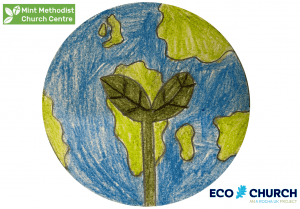
Young Church : 3 Generate
From Saturday afternoon 1st Oct through to the morning service on Sunday 2nd Oct there will be a sleep-over at The Mint for
young church members and their parents. This is our local version of the Methodist Church’s Children and Youth Assembly event being held at the NEC in Birmingham at the same time. As part of this activity young church members will discuss what they’d like to see from the Methodist church. The last time we did this, tackling climate change was high on the agenda, and the resulting manifesto provided significant motivation for the formation of our eco-church group. Participation is open to young church members and parents, and environmental concerns that are discussed and highlighted will be reported in a future issue.
Green Event at St David’s Church, Saturday 24th September, 10am-2pm
St David’s, Christians Together Across Exeter and Exeter Cycling Campaign are hosting an event on living more sustainably. There will be all sorts of stalls and activities, including Passivhaus (reducing energy use in buildings), Our Blue Planet – the Oceans, cycling in Exeter, making and mending things, Traidcraft, harvest produce, tea and cakes, children’s activities and much more. Admission free, vegetarian lunch £5.
Knowing God, Knowing Creation
In the service led by the Eco Church Team on 24 July, I argued that the better we know God the better we shall understand our relationship with the rest of creation. Here is a summary of the main points; you can still watch the full sermon on the Mint’s YouTube Channel: (https://www.youtube.com/watch?v=l6PBFg21g8k).
- The creation is the overflow of God’s perfect love.
The three who are the Trinity enjoy perfect love together, and as even humans discover such love cannot be kept between the lovers but must be shared. Creation did not come about because God needed anything from it but because God needed to share the love God enjoyed with creatures who could then enjoy it too. The creation was planned to replicate the loving relationships within the Trinity, of mutual appreciation, respect, care and love. How could such a God have made any other kind of a world?
- Creation is born out of co-operation.
Genesis 1 reveals in the first three verses that God, the Spirit of God, and the Word of God were each involved in creating, and this is made clearer in verses 26-27 where God says, “Let us make humankind in our own image… So God created humankind in God’s image… male and female God created them”. Father, Son and Spirit made the universe co-operatively, and that is true of every subsequent act of God or dimension of our relationship with God, that it is by nature Trinitarian. The shape of the universe and its parts is what you get when perfect teamwork is in operation. This cooperation defines the way we should think of ourselves and other parts of the created order, as needing each other to fulfil God’s purposes. Eco-awareness is part of our essential life mission, not some random ethical requirement.
- Relationships in the creation are not hierarchical.
This is implicit in the previous point but needs highlighting because it is where sin has really messed things up. Even today we have not finished learning that given that our Creator is a Trinity of equals, all humans are inevitably equal in their sharing of the divine image, for example as regards that specific reference to male and female. We have a long way to go before we properly recognise that other parts of creation too have an equal value to human beings. But why would a God who knows only the equality and harmony of perfect love create a world with a different design – One where humans are the centrepiece of the only ones that matter with other creatures as mere props for us? In truth we are part of a non-hierarchical fellowship of life, made for mutual dependence and mutual joy, where individuality finds fulfilment in reciprocated loving relationships rather than asserting our imagined rights against other people or other creatures. Stephen Mosedale
Because of all this we can learn much about God from the living things that were made along with us, so next month we’ll start a series of articles entitled “Knowing creation, Knowing God”. Watch this space.
